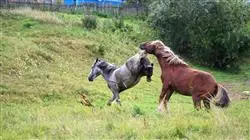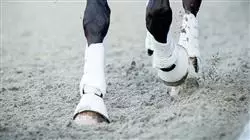University certificate
The world's largest faculty of veterinary medicine”
Introduction to the Program
A complete and total update in Ruminant and Equine Production and Health with the most complete and effective training program on the online educational market"

In order to do a good job in the field, the professional must have a solid theoretical knowledge of anatomy, pathophysiology and therapeutics, which they already possess through their higher academic training. But university programs sometimes lack extended and practical training.
The Postgraduate diploma develops the anatomy and physiology of the species of interest, focusing on the characteristics of each species from a pathophysiological point of view, directly related to animal health.
After completing this training, the veterinary professional will have developed a specialized, broad and interrelated vision of the anatomy and physiology of the animal species under study and will be able to understand in a simple and global way the processes that can affect these individuals.
Feeding in livestock and wildlife farms requires the optimal application of feeding procedures that allow the animal to obtain a balanced ration in terms of energy and nutrients. Therefore, it is essential to expand the principles governing the nutrition of different species, the nutritional value and characteristics of different foods, as well as the process of their preparation. This is so that the administrator or manager has the ability to make decisions and propose feeding techniques as part of their professional performance.
The general objective of this Postgraduate diploma is that the professional develops a specialized knowledge of animal nutrition and feed. They will apply the concepts of good sanitary and agricultural practices, ensuring the quality and safety of the food consumed by animals, without disturbing the health and profitability derived from agricultural and hunting activities, with a focus on prevention and sanitary control.
Through studying this course, the student will gain satisfaction in being able to apply the theoretical knowledge they acquired in concrete practical cases.
Join the elite, with this highly effective training training and open new paths to help you advance in your professional progress"
This Postgraduate diploma in Ruminant and Equine Production and Health offers you the advantages of a high-level scientific, teaching, and technological course. These are some of its most notable features:
- Latest technology in online teaching software
- Highly visual teaching system, supported by graphic and schematic contents that are easy to assimilate and understand
- Practical cases presented by practising experts
- State-of-the-art interactive video systems
- Teaching supported by telepractice
- Continuous updating and recycling systems
- Self-regulating learning: full compatibility with other occupations
- Practical exercises for self-evaluation and learning verification
- Support groups and educational synergies: questions to the expert, debate and knowledge forums
- Communication with the teacher and individual reflection work
- Content that is accessible from any fixed or portable device with an Internet connection
- Supplementary documentation databases are permanently available, even after the course
A complete training program that will allow you to acquire the most advanced knowledge in all the areas of intervention of a specialized veterinarian"
Our teaching staff is made up of professionals from different fields related to this specialty. In this way, we ensure that we provide you with the training update we are aiming for. A multidisciplinary team of professionals trained and experienced in different environments, who will develop the theoretical knowledge in an efficient way, but above all, they will bring their practical knowledge from their own experience to the course: one of the differential qualities of this training.
This mastery of the subject matter is complemented by the effectiveness of the methodological design. Developed by a multidisciplinary team of e-learning experts, it integrates the latest advances in educational technology. This way, you will be able to study with a range of comfortable and versatile multimedia tools that will give you the operability you need in your training.
The design of this program is based on Problem-Based Learning: an approach that conceives learning as a highly practical process. To achieve this remotely, we will use telepractice: with the help of an innovative interactive video system, and learning from an expert, you will be able to acquire the knowledge as if you were actually dealing with the scenario you are learning about. A concept that will allow you to integrate and fix learning in a more realistic and permanent way.
With the experience of working professionals and the analysis of real cases of success, in a high-impact training approach"

With a methodological design based on proven teaching techniques, this innovative course will take you through different teaching approaches to allow you to learn in a dynamic and effective way"
Why study at TECH?
TECH is the world’s largest online university. With an impressive catalog of more than 14,000 university programs available in 11 languages, it is positioned as a leader in employability, with a 99% job placement rate. In addition, it relies on an enormous faculty of more than 6,000 professors of the highest international renown.

Study at the world's largest online university and guarantee your professional success. The future starts at TECH”
The world’s best online university according to FORBES
The prestigious Forbes magazine, specialized in business and finance, has highlighted TECH as “the world's best online university” This is what they have recently stated in an article in their digital edition in which they echo the success story of this institution, “thanks to the academic offer it provides, the selection of its teaching staff, and an innovative learning method aimed at educating the professionals of the future”
A revolutionary study method, a cutting-edge faculty and a practical focus: the key to TECH's success.
The most complete study plans on the university scene
TECH offers the most complete study plans on the university scene, with syllabuses that cover fundamental concepts and, at the same time, the main scientific advances in their specific scientific areas. In addition, these programs are continuously being updated to guarantee students the academic vanguard and the most in-demand professional skills. In this way, the university's qualifications provide its graduates with a significant advantage to propel their careers to success.
TECH offers the most comprehensive and intensive study plans on the current university scene.
A world-class teaching staff
TECH's teaching staff is made up of more than 6,000 professors with the highest international recognition. Professors, researchers and top executives of multinational companies, including Isaiah Covington, performance coach of the Boston Celtics; Magda Romanska, principal investigator at Harvard MetaLAB; Ignacio Wistumba, chairman of the department of translational molecular pathology at MD Anderson Cancer Center; and D.W. Pine, creative director of TIME magazine, among others.
Internationally renowned experts, specialized in different branches of Health, Technology, Communication and Business, form part of the TECH faculty.
A unique learning method
TECH is the first university to use Relearning in all its programs. It is the best online learning methodology, accredited with international teaching quality certifications, provided by prestigious educational agencies. In addition, this disruptive educational model is complemented with the “Case Method”, thereby setting up a unique online teaching strategy. Innovative teaching resources are also implemented, including detailed videos, infographics and interactive summaries.
TECH combines Relearning and the Case Method in all its university programs to guarantee excellent theoretical and practical learning, studying whenever and wherever you want.
The world's largest online university
TECH is the world’s largest online university. We are the largest educational institution, with the best and widest online educational catalog, one hundred percent online and covering the vast majority of areas of knowledge. We offer a large selection of our own degrees and accredited online undergraduate and postgraduate degrees. In total, more than 14,000 university degrees, in eleven different languages, make us the largest educational largest in the world.
TECH has the world's most extensive catalog of academic and official programs, available in more than 11 languages.
Google Premier Partner
The American technology giant has awarded TECH the Google Google Premier Partner badge. This award, which is only available to 3% of the world's companies, highlights the efficient, flexible and tailored experience that this university provides to students. The recognition as a Google Premier Partner not only accredits the maximum rigor, performance and investment in TECH's digital infrastructures, but also places this university as one of the world's leading technology companies.
Google has positioned TECH in the top 3% of the world's most important technology companies by awarding it its Google Premier Partner badge.
The official online university of the NBA
TECH is the official online university of the NBA. Thanks to our agreement with the biggest league in basketball, we offer our students exclusive university programs, as well as a wide variety of educational resources focused on the business of the league and other areas of the sports industry. Each program is made up of a uniquely designed syllabus and features exceptional guest hosts: professionals with a distinguished sports background who will offer their expertise on the most relevant topics.
TECH has been selected by the NBA, the world's top basketball league, as its official online university.
The top-rated university by its students
Students have positioned TECH as the world's top-rated university on the main review websites, with a highest rating of 4.9 out of 5, obtained from more than 1,000 reviews. These results consolidate TECH as the benchmark university institution at an international level, reflecting the excellence and positive impact of its educational model.” reflecting the excellence and positive impact of its educational model.”
TECH is the world’s top-rated university by its students.
Leaders in employability
TECH has managed to become the leading university in employability. 99% of its students obtain jobs in the academic field they have studied, within one year of completing any of the university's programs. A similar number achieve immediate career enhancement. All this thanks to a study methodology that bases its effectiveness on the acquisition of practical skills, which are absolutely necessary for professional development.
99% of TECH graduates find a job within a year of completing their studies.
Postgraduate Diploma in Ruminant and Equine Production and Health
.
The veterinary sector oriented to ruminant and equine production care is of great importance in the food and veterinary industry. The demand for products such as meat and milk has increased considerably in recent years, leading to an increased need for veterinarians highly trained in the handling of these animals to ensure their welfare. Because of this, the Postgraduate Diploma in Ruminant and Equine Production and Health has been designed, which will provide you with extensive knowledge in this field to boost your growth in this demanded branch of Veterinary Medicine.
Combine your learning with your personal and professional obligations
.
Do you want to know the advanced procedures to detect the nutritional needs of ruminants and equines or the cutting-edge protocols to manage the most common diseases in these animals? You're in luck! Through the Postgraduate Diploma in Ruminant and Equine Production and Health, you will obtain an excellent update in this field to place you at the forefront of Veterinary Medicine. In this way, you will become a professional of reference in the sector, without the need to make uncomfortable daily commuting, since this degree is taught 100% online.







